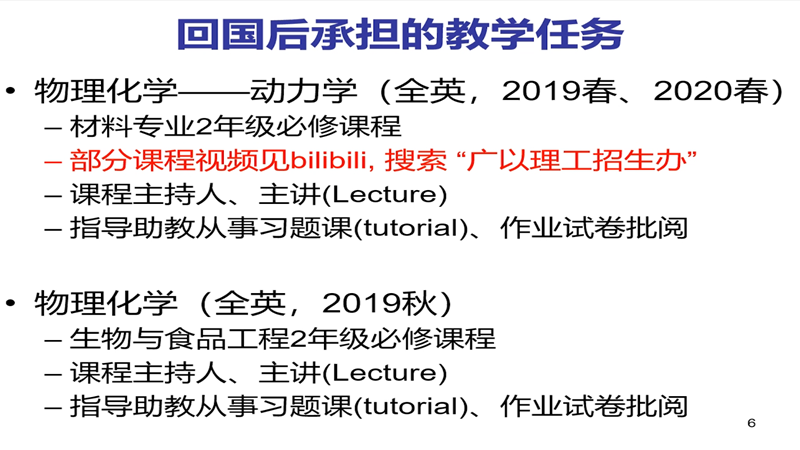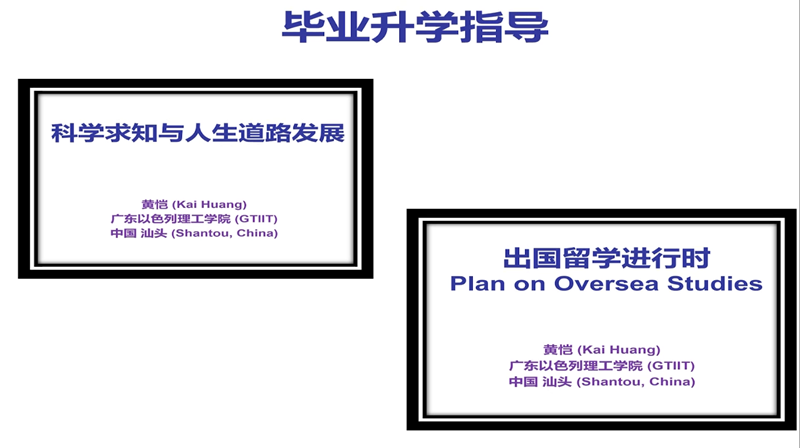PostTime:7/22/2020
In order to satisfy your curiosity, Professor Ori Lahav, Dean of Undergraduate Studies, recently made a detailed introduction on the characteristics of undergraduate teaching, credit score requirements, examination regulations and other contents of the school.
Teaching Characteristic
Our university has 4 undergraduate majors, including Materials Science and Engineering, Chemical Engineering, Biotechnology and Food Engineering, and Mathematics with Computer Science. Among them, math and computer science majors will first enroll students in the fall of 2020.
We offer a four-year undergraduate education. In order to better adapt to the new teaching model, all students are required to complete three courses, including mathematics, physics and English (small class), in the preparatory period before the formal term begins.
In the first year of the undergraduate course, the university mainly arranges basic compulsory courses for students, such as chemistry, biology, mathematics and physics, as well as specialized English courses and one or two specialty overview courses. In the second year, while arranging compulsory basic courses, we have added more specialized courses, computer programming language courses, statistics and other auxiliary courses. Junior college courses are more advanced professional compulsory courses and elective courses. In addition to some advanced courses, there are graduation projects. Graduation projects are generally divided into engineering practice or research, with specific requirements determined by each major. In addition, students also need to take general elective courses, physical education and ideological and political theory courses for the corresponding credits.
In terms of curriculum setting, the university adopts the western teaching mode, which mainly imparts knowledge through teaching, exercises, experiments and graduation projects. Each course generally has 2-3 hours of lecture and 1-2 hours of recitation per week to help students better understand the course content. Lectures emphasize professional theoretical knowledge, while exercises focus on improving students' ability to solve practical problems. They are usually taught by different teachers. Some courses offer experimental courses, generally from the second year to the graduation year.
Credit Requirement
Undergraduates in our university need to get enough credits to graduate successfully. The credit requirements of each major are slightly different, but the total credit range is around 155-160. On average, students should take about 20 credits per semester, or six to eight courses. Our school has only 13 weeks of teaching each semester, followed by a month or so of exams. In general, final exams are arranged for each course. Most courses also have midterm exams to check students' learning status periodically. Typically, we call the midterm exam an "umbrella" test, in which high scores on the midterm count toward a student's overall score and low scores don't.
In terms of academic performance, students with a GPA of 85 or above will have the opportunity to be awarded with the honor of Dean's List. Students with a GPA of 90 or above are awarded the Vice President's Commendation List. The listed students will receive scholarships.
The university will set up a special committee to discuss the students with GPA lower than 65, course success rate lower than 66%, total credits of the first academic year lower than 27, study duration over 8 semesters, and failure to meet relevant English requirements in the fourth semester. For students' academic performance is not ideal, hope that through the following tools to help its schools to raise test scores, the dean of personal learning plan, professional learning consultant one-to-one communication, after school English course, summer (provide students with the chance of a part of the course rebuilt), peer derivative (senior student to help junior student), mental health counselors, etc.
Exam Regulations
The final exam for each course will be A and B exams, and students can choose to take either A or B exams, or both. Students who fail A must take B. Students who pass A can also choose B if they are not satisfied with the score. If A student takes both A and B at the same time, the result of the B exam will be included in the total rather than the higher score. At the same time, students should strictly follow the examination discipline and should not cheat.
Professor Ori Lahav made an introduction on the characteristics of undergraduate teaching
Assistant Professor Huang Kai, who is popular with students of GTIIT, shared his experience on undergraduate teaching.
Assistant Professor Huang shared his experience on undergraduate teaching
Assistant Professor Huang is currently teaching dynamics and physical chemistry. GTIIT has introduced the distinctive and traditional teaching methods from the original of Israel, under the guidance of Jacob Katriel, full professor of Chemistry Department of Israel Institute of Technology. During the epidemic, part of the courses were conducted through Bilibili, which is popular with young students today. Physical chemistry courses were explained through real-time teaching, and the teaching information was timely fed back, realizing efficient interaction between teachers and students. In addition, the TA would collect common questions from students after each lecture and explained the problem to the students in the tutorial class.

In terms of guidance for graduation and further study, GTIIT will provide relevant lectures to answer questions of students at different stages, such as providing guidance on "scientific knowledge seeking and life path development" for junior students, and offering targeted lectures on different development directions for juniors and seniors after graduation.

Assistant Professor Huang has given great support to students for further study or internship. He is willing to write letters of recommendation for qualified students to help them achieve better development.
Text/Photos: GTIIT News & Public Affairs
© GUANGDONG TECHNION-ISRAEL INSTITUTE OF TECHNOLOGY | 粤ICP备17036470号
